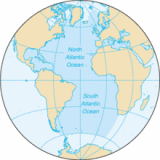
ic divisions. With a total area
of about 106400000 square kilometres (41,081,269.7 sq mi), it covers approximately 20% of the Earth
's surface and about 26% of its water
surface area. The first part of its name refers to Atlas
of Greek mythology
, making the Atlantic the "Sea of Atlas".
The oldest known mention of "Atlantic" is in The Histories
of Herodotus
around 450 BC (Hdt.
1492 Christopher Columbus sails from La Gomera in the Canary Islands, his final port of call before crossing the Atlantic for the first time.
1520 The Strait of Magellan, the passage immediately south of mainland South America, connecting the Pacific and the Atlantic Oceans, is first navigated by Ferdinand Magellan during his global circumnavigation voyage.
1520 After navigating through the South American strait, three ships under the command of Portuguese explorer Ferdinand Magellan reach the Pacific Ocean, becoming the first Europeans to sail from the Atlantic Ocean to the Pacific.
1815 Napoleon I of France begins his exile on Saint Helena in the Atlantic Ocean.
1819 The {{SS|Savannah}} leaves port at Savannah, Georgia, United States, on a voyage to become the first steamship to cross the Atlantic Ocean. The ship arrived at Liverpool, England on June 20.
1854 The steamship ''SS Arctic'' sinks with 300 people on board. This marks the first great disaster in the Atlantic Ocean.
1855 The first locomotive runs from the Atlantic Ocean to the Pacific Ocean on the Panama Railway.
1912 The British passenger liner, the {{RMS|Titanic}}, sinks in the North Atlantic at 2:20 a.m., two and a half hours after hitting an iceberg. 1,517 people are killed.
1919 The British dirigible R34 lands in New York, completing the first crossing of the Atlantic Ocean by an airship.
1919 The British airship R34 lands in Norfolk, England, completing the first airship return journey across the Atlantic in 182 hours of flight.

